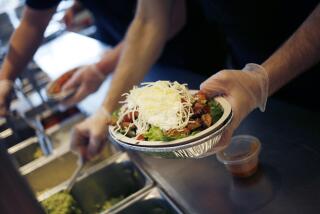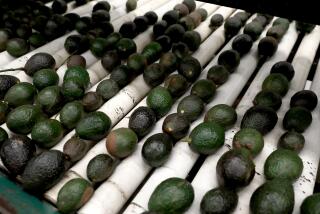Calm down: The Great Chipotle Guacamole Scare is a non-issue. Right?
Chipotle fans – and there are many – are in a near panic over a recent report from the company which seems to suggest that climate change could cause guacamole to disappear from the chain’s menu.
The reality may be much less dramatic.
The hullaballoo started earlier this week when the Thinkprogress.org blog drew attention to Chipotle’s annual report, filed last month with the Securities and Exchange Commission.
In a section of the report covering “risks related to operating in the restaurant industry,” the Mexican-style chain mentioned that “changes in food and supply costs could adversely affect our results of operations.”
Factors for such changes include “general economic conditions, seasonal fluctuations, weather conditions, global demand, food safety concerns, generalized infectious diseases, fluctuations of the U.S. dollar, product recalls and government regulations,” according to Chipotle.
The company went on to describe how prices for many ingredients “escalated markedly” during 2013 and will likely continue to rise during 2014, especially for avocados and meat. Recent drought conditions haven’t helped.
The chain also explained that its focus on sustainable and responsible sourcing forces it to operate in “generally smaller and more concentrated” markets, where pricing fluctuations are often more deeply felt.
But the passage that seems to have resonated most with Americans notes that “increasing weather volatility or other long-term changes in global weather patterns, including any changes associated with global climate change” might impact the price or availability of Chipotle’s ingredients.
One possible outcome could lead Chipotle to “choose to temporarily suspend serving menu items, such as guacamole or one or more of our salsas, rather than paying the increased cost for the ingredients,” the report notes.
The Denver chain acknowledges that such a change could cause restaurant traffic and sales to take a hit and even damage the Chipotle brand. And that certainly seems likely, given the recent outcry over the prospect of an existence sans guacamole.
But how likely is such a state of being?
Chipotle doesn’t actually expect avocados to become so difficult to grow that they’re unaffordable. Instead, the chain likely mentioned the effect of climate change to cover its bases with investors.
Other alerts from Chipotle in the same report caution that revenue could suffer if the company has trouble renewing existing leases or that some restaurants may close temporarily if an outbreak of food-borne illness occurs.
Such warnings are par for the course for public companies filing regulatory documents.
As Chipotle spokesman Chris Arnold wrote in an email, the warning “is nothing more than routine and required disclosure. The sky is not falling.”
“We have seen similar conditions with regard to avocados before – and incurred higher prices because of that – but we have never stopped serving guac and don’t anticipate that now,” he wrote.
It’s a “non-issue,” he said.
Chipotle makes an awful lot of guacamole, and 70 avocados are required for each batch. The company uses 97,000 pounds of the fruit on an average day, or 35.4 million pounds a year.
But the avocado industry appears equipped to handle the demand, at least for now.
Last year, nearly 1.7 billion pounds of avocados entered the U.S. market, 460 million pounds of the total originating from California, according to the Hass Avocado Board.
That’s 10.6% higher than the 1.5 billion pounds recorded in 2012 and 48% more than the 1.1 billion pounds noted in 2011.
So far this year, 37.6 million pounds of avocados are on the books domestically, compared to 33.4 million pounds over the same period last year.
But Chipotle may be squeezed further down the line if avocado production dwindles, said Motley Fool analyst Jason Moser.
“We have always known that Chipotle’s supply chain at this stage of its life faces greater risk of being constrained because of the fact that management has proven time and time again that they aren’t going to cut corners on the quality of the ingredients,” he said.
Still, Chipotle “generates gobs of free cash flow” and has more than $500 million in cash and equivalents with no debt, so Moser said he expects “to see the company invest more in its supply chain as time goes on in order to mitigate issues like this in the future.”
Chipotle was a leader in the boom over the last decade of fast casual restaurants, which became popular during the recession because of their affordable prices and commitment to sourcing, said analyst Andy Brennan of IBISWorld.
The chain has garnered strong brand loyalty and awareness and is a Wall Street darling. The stock was trading around $50 a share five years ago, flirting with $400 a share two years ago and has risen nearly 10% since the beginning of the year.
On Wednesday, Chipotle was down less than a percent, or $3.60, to $581.23 a share in early afternoon trading in New York.
Higher food prices, especially for organic produce, will “be an ongoing theme across the entire food services segment in 2014,” according to IBISWorld.
“Fresh produce is one of the competitive advantages of gourmet fast casual restaurants such as Chipotle,” Brennan wrote. “However, due to intense competition in the food services sector, there is some risk that higher menu prices may price out some consumers.”
ALSO:
Chipotle, Panera, fast-casual chains continue restaurant reign
Taco Bell breakfast to go national: Prepare for the waffle taco
Chipotle federal immigration probe: ‘We didn’t do anything wrong’







